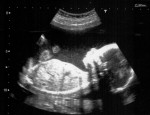–
(The Judgment of Justices Beetz and Estey begins on page 80 at R v Morgentaler [1988]. For a summary of their reasons, click here.)
–
Like the Chief Justice, Justice Beetz restricted his remarks to addressing the breach to the Charter 7 right to “security of the person.” But he took a narrower approach than did the Chief Justice to defining “security of the person.” As Law Professor Sheilah Martin describes it, Beetz concluded “that section 7 only protects the interests of pregnant women who require an abortion for the medical reason that their life or health are jeopardized.” He viewed “health” as consisting of physical and psychological components, but as Professor Martin notes,
…he did not grant constitutional recognition to a women’s (sic) right to choose to terminate her pregnancy. He merely said that a pregnant woman who requires an abortion for a medical reason cannot lawfully be presented with the choice of either obtaining an illegal abortion, with its attendant risk of criminal sanction, and being forced to suffer the physical and psychological consequences of the significant and unnecessary delays caused by the procedural requirements of section 251(4).1
Justice Beetz said:
“Security of the person” within the meaning of s. 7 of the Charter must include a right of access to medical treatment for a condition representing a danger to life or health without fear of criminal sanction. If an act of Parliament forces a pregnant woman whose life or health is in danger to choose between, on the one hand, the commission of a crime to obtain effective and timely medical treatment and, on the other hand, inadequate treatment or no treatment at all, her right to security of the person has been violated.
According to the evidence, the procedural requirements of s. 251 of the Criminal Code significantly delay pregnant women’s access to medical treatment resulting in an additional danger to their health, thereby depriving them of their right to security of the person. This deprivation does not accord with the principles of fundamental justice. While Parliament is justified in requiring a reliable, independent and medically sound opinion as to the “life or health” of the pregnant woman in order to protect the state interest in the foetus, and while any such statutory mechanism will inevitably result in some delay, certain of the procedural requirements of s. 251 of the Criminal Code are nevertheless manifestly unfair. These requirements are manifestly unfair in that they are unnecessary in respect of Parliament’s objectives in establishing the administrative structure and in that they result in additional risks to the health of pregnant women.
The following statutory requirements contribute to the manifest unfairness of the administrative structure imposed by the Criminal Code: (1) the requirement that all therapeutic abortions must take place in an “accredited” or “approved” hospital as defined in s. 251(6); (2) the requirement that the committee come from the accredited or approved hospital in which the abortion is to be performed; (3) the provision that allows hospital boards to increase the number of members of a committee; (4) the requirement that all physicians who practise lawful therapeutic abortions be excluded from the committees. (R v Morgentaler at pp. 34-35)
Justice Beetz made it clear that a life and health standard in order to protect the fetus did not violate “security of the person” nor did the requirement for a second medical opinion.2 Such delays were acceptable. As Professor Martin notes:
In accepting that legal limits on why a woman may obtain an abortion are constitutionally acceptable, he must logically countenance an administrative structure the purpose of which is to enforce conformity to the imposed decision-making standard. The inevitable delay caused by such a review process would be constitutionally acceptable, according to Mr. Justice Beetz. Chief Justice Dickson gave no opinion on the matter.3
Justice Beetz explained his reasoning that Parliament is justified in requiring a second medical opinion thus:
While a second medical opinion is very often seen as necessary in medical circles when difficult questions as to a patient’s life or health are at issue, the independent opinion called for by the Criminal Code has a different purpose. Parliament requires this independent opinion because it is not only the woman’s interest that is at stake in a decision to authorize an abortion. The Ontario Court of Appeal alluded to this at p. 378 when it stated that “One cannot overlook the fact that the situation respecting a woman’s right to control her own person becomes more complex when she becomes pregnant, and that some statutory control may be appropriate”. The presence of the foetus accounts for this complexity. By requiring an independent medical opinion that the pregnant woman’s life or health is in fact endangered, Parliament seeks to ensure that, in any given case, only therapeutic reasons will justify the decision to abort. The amendments to the Criminal Code in 1969 amounted to a recognition by Parliament, as I have said, that the interest in the life or health of the pregnant woman takes precedence over the interest of the state in the protection of the foetus when the continuation of the pregnancy would or would be likely to endanger the pregnant woman’s life or health. Parliament decided that it was necessary to ascertain this from a medical point of view before the law would allow the interest of the pregnant woman to indeed take precedence over that of the foetus and permit an abortion to be performed without criminal sanction.
I do not believe it to be unreasonable to seek independent medical confirmation of the threat to the woman’s life or health when such an important and distinct interest hangs in the balance. (R v Morgentaler at pp. 111-112)
In other words, Justice Beetz recognized that abortion was not like other medical procedures in that the life of the fetus must be taken into consideration in addition to the health of the woman. And this required a balancing of interests.
Unlike the Chief Justice, Justice Beetz did not view the test for danger to the woman’s health to be so vague as to be a violation of fundamental justice.4 Rather, it was the following requirements, because they caused unnecessary delays thus putting a woman whose life or health was in danger at additional risk, that were a violation of fundamental justice according to Justice Beetz: abortions could only be performed in hospitals; each hospital must have an abortion committee; allowing no ceiling on number of members on a committee (number should be small to avoid unnecessary delay); excluding from abortion committees doctors who perform abortions.5
Justice Beetz did not say that the lack of timely access itself was a violation of “security of the person” (he gave no opinion on this). Rather, the problem was that a criminal law was precluding timely access, and forcing a woman to choose between her health and avoiding committing a crime was a violation of her “security of the person”:
Enjoying “security of the person” free from criminal sanction is central to understanding the violation of the Charter right which I describe herein. It is not necessary to decide whether s. 7 would apply in other circumstances.
A pregnant woman’s person cannot be said to be secure if, when her life or health is in danger, she is faced with a rule of criminal law which precludes her from obtaining effective and timely medical treatment.
Generally speaking, the constitutional right to security of the person must include some protection from state interference when a person’s life or health is in danger. The Charter does not, needless to say, protect men and women from even the most serious misfortunes of nature. Section 7 cannot be invoked simply because a person’s life or health is in danger. The state can obviously not be said to have violated, for example, a pregnant woman’s security of the person simply on the basis that her pregnancy in and of itself represents a danger to her life or health. There must be state intervention for “security of the person” in s. 7 to be violated.
If a rule of criminal law precludes a person from obtaining appropriate medical treatment when his or her life or health is in danger, then the state has intervened and this intervention constitutes a violation of that man’s or that woman’s security of the person. “Security of the person” must include a right of access to medical treatment for a condition representing a danger to life or health without fear of criminal sanction. If an act of Parliament forces a person whose life or health is in danger to choose between, on the one hand, the commission of a crime to obtain effective and timely medical treatment and, on the other hand, inadequate treatment or no treatment at all, the right to security of the person has been violated. (R v Morgentaler at p. 90)
Justice Beetz recognized that protection of the fetus is a pressing and substantial concern in a free and democratic society and would justify limits being placed on a woman’s right to obtain an abortion:
The primary objective of s. 251 of the Criminal Code is the protection of the foetus. The protection of the life and health of the pregnant woman is an ancillary objective. The primary objective does relate to concerns which are pressing and substantial in a free and democratic society and which, pursuant to s. 1 of the Charter, justify reasonable limits to be put on a woman’s right. (R v Morgentaler at p. 82)
And:
I am of the view that the protection of the foetus is and, as the Court of Appeal observed, always has been, a valid objective in Canadian criminal law. I have already elaborated on this objective in my discussion of the principles of fundamental justice. I think s. 1 of the Charter authorizes reasonable limits to be put on a woman’s right having regard to the state interest in the protection of the foetus. (R v Morgentaler at p. 124)
–
Reasons of Dickson and Lamer
Reasons of Madam Justice Wilson
–
(Go back to Summary of the Majority Opinion)
–
References:
- Martin, Sheilah L., “Morgentaler v The Queen in the Supreme Court of Canada,” Canadian Journal of Women & the Law; 1987-1988, Vol. 2 Issue 2, p. 426. ↩
- “Crimes Against the Foetus,” Law Reform Commission of Canada, Working Paper 58, 1989, p. 93, 94 ↩
- Martin, p. 426 ↩
- Morton, Mildred, “The Morgentaler Judgment: How the Decisions Differ,” Law and Government Division, Library of Parliament, 9 February 1988, p. 8 ↩
- Morton, p. 9 ↩



